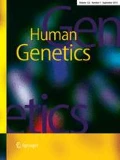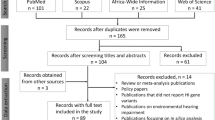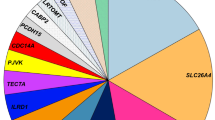Abstract
Hereditary hearing impairment (HI) is a heterogeneous condition with over 130 genes associated with genetic non-syndromic HI (NSHI) and Usher syndrome (USH). Approximately 80% of hereditary NSHI cases have autosomal recessive (AR) mode of inheritance. The high rate of consanguinity and endogamy in the Maghreb countries, including Tunisia, Algeria and Morocco, represents a major contributing factor to the development of ARHI. Since the 90s, those populations, with their particular large familiar structure, represented an effective key towards the discovery of the first HI loci and genes. In this study, we performed a deep literature database search to analyze the mutational spectrum and the distribution of pathogenic variants responsible of USH and the NSHI among those populations. To date, 124 pathogenic variants were identified in 32 genes of which over 70% represent population-specific variants. The particular variants’ distribution is related to the high rate of consanguinity as well as the multiple shared features such as demographic history of migrations and social behavior that promoted the spreading of several founder mutations within those countries. This is the first study to report lessons from the past and current actualities of HI within the three Maghreb countries. However, despite the great impact placed by such population for the HI genetic studies, only a few next-generation sequencing platforms have so far been implemented with those countries. We, therefore, believe that those countries should be supported to implement this technology that would definitely be of great value in the discovery of additional novel HI genes/variants.



Similar content being viewed by others
Availability of data and material
Not applicable.
Code availability
Not applicable.
References
Abdi S, Bahloul A, Behlouli A, Hardelin J-P, Makrelouf M, Boudjelida K, Louha M et al (2016) Diversity of the genes implicated in Algerian patients affected by usher syndrome. PLoS ONE. https://doi.org/10.1371/journal.pone.0161893
Abidi O, Boulouiz R, Nahili H, Ridal M, Alami MN, Tlili A, Rouba H et al (2007) GJB2 (Connexin 26) gene mutations in Moroccan patients with autosomal recessive non-syndromic hearing loss and carrier frequency of the common GJB2-35delG mutation. Int J Pediatr Otorhinolaryngol 71(8):1239–1245. https://doi.org/10.1016/j.ijporl.2007.04.019
Ahmed ZM, Masmoudi S, Kalay E, Belyantseva IA, Mosrati MA, Collin RWJ, Riazuddin S et al (2008) Mutations of LRTOMT, a fusion gene with alternative reading frames, cause nonsyndromic deafness in humans. Nat Genet 40(11):1335–1340. https://doi.org/10.1038/ng.245
Ahmed ZM, Frolenkov G, Riazuddin S (2013) Usher proteins in inner ear structure and function. Physiol Genom 45(21):987–989. https://doi.org/10.1152/physiolgenomics.00135.2013
Ammar-Khodja F, Bonnet C, Dahmani M, Ouhab S, Lefèvre GM, Ibrahim H, Hardelin J-P, Weil D, Louha M, Petit C (2015) Diversity of the causal genes in hearing impaired Algerian individuals identified by whole exome sequencing. Mol Genet Genom Med 3(3):189–196. https://doi.org/10.1002/mgg3.131
Bakhchane A, Bousfiha A, Charoute H, Salime S, Detsouli M, Snoussi K, Nadifi S et al (2016) Update of the spectrum of GJB2 gene mutations in 152 Moroccan families with autosomal recessive nonsyndromic hearing loss. Eur J Med Genet 59(6–7):325–329. https://doi.org/10.1016/j.ejmg.2016.05.002
Bakhchane A, Charif M, Bousfiha A, Boulouiz R, Nahili H, Rouba H, Charoute H, Lenaers G, Barakat A (2017) Novel compound heterozygous MYO7A mutations in Moroccan families with autosomal recessive non-syndromic hearing loss. PLoS ONE. https://doi.org/10.1371/journal.pone.0176516
Behlouli A, Bonnet C, Abdi S, Bouaita A, Lelli A, Hardelin J-P, Schietroma C et al (2014) EPS8, encoding an actin-binding protein of cochlear hair cell stereocilia, is a new causal gene for autosomal recessive profound deafness. Orphanet J Rare Dis 9(avril):55. https://doi.org/10.1186/1750-1172-9-55
Bekada A, Fregel R, Cabrera VM, Larruga JM, Pestano J, Benhamamouch S, González AM (2013) Introducing the Algerian mitochondrial DNA and Y-chromosome profiles into the North African landscape. PLoS ONE. https://doi.org/10.1371/journal.pone.0056775
Belguith H, Hajji S, Salem N, Charfeddine I, Lahmar I, Amor MB, Ouldim K et al (2005) Analysis of GJB2 mutation: evidence for a Mediterranean ancestor for the 35delG mutation. Clin Genet 68(2):188–189. https://doi.org/10.1111/j.1399-0004.2005.00474.x
Belguith H, Tlili A, Dhouib H, Rebeh IB, Lahmar I, Charfeddine I, Driss N, Ghorbel A, Ayadi H, Masmoudi S (2009) Mutation in gap and tight junctions in patients with non-syndromic hearing loss. Biochem Biophys Res Commun 385(1):1–5. https://doi.org/10.1016/j.bbrc.2009.02.125
Ben Arab S, Masmoudi S, Beltaief N, Hachicha S, Ayadi H (2004) Consanguinity and endogamy in Northern Tunisia and its impact on non-syndromic deafness. Genet Epidemiol 27(1):74–79. https://doi.org/10.1002/gepi.10321
Ben Ayed I, Ouarda W, Frikha F, Kammoun F, Souissi A, Ben Said M, Bouzid A et al (2021) SRD5A3-CDG: 3D structure modeling, clinical spectrum, and computer-based dysmorphic facial recognition. Am J Med Genet A 185(4):1081–1090. https://doi.org/10.1002/ajmg.a.62065
Ben Halim N, Bouafif NBA, Romdhane L, Atig RKB, Chouchane I, Bouyacoub Y, Arfa I et al (2013) Consanguinity, endogamy, and genetic disorders in Tunisia. J Commun Genet 4(2):273–284. https://doi.org/10.1007/s12687-012-0128-7
Ben Rebeh I, Grati M, Bonnet C, Bouassida W, Hadjamor I, Ayadi H, Ghorbel A, Petit C, Masmoudi S (2016) Genetic analysis of Tunisian families with Usher syndrome type 1: toward improving early molecular diagnosis. Mol vis 22(juillet):827–835
Booth KT, Azaiez H, Kahrizi K, Simpson AC, Tollefson WTA, Sloan CM, Meyer NC et al (2015) PDZD7 and hearing loss: more than just a modifier. Am J Med Genet A 167(12):2957–2965. https://doi.org/10.1002/ajmg.a.37274
Bosch E, Calafell F, Pérez-Lezaun A, Clarimón J, Comas D, Mateu E, Martínez-Arias R et al (2000) Genetic structure of North-West Africa revealed by STR analysis. Eur J Hum Genet 8(5):360–366. https://doi.org/10.1038/sj.ejhg.5200464
Bouazzaoui NL (1994) Consanguinity and public health in Morocco. Bulletin De L’academie Nationale De Medecine 178(6):1013–1025 (discussion 1025–1027)
Bouzid A, Smeti I, Chakroun A, Loukil S, Gibriel AA, Grati M, Ghorbel A, Masmoudi S (2018) CDH23 methylation status and presbycusis risk in elderly women. Front Aging Neurosci. https://doi.org/10.3389/fnagi.2018.00241
Brownstein Z, Gulsuner S, Walsh T, Martins FTA, Taiber S, Isakov O, Lee MK et al (2020) Spectrum of genes for inherited hearing loss in the Israeli Jewish population, including the novel human deafness gene ATOH1. BioRxiv. https://doi.org/10.1101/2020.06.11.144790
Chakchouk I, Said MB, Jbeli F, Benmarzoug R, Loukil S, Smeti I, Chakroun A et al (2015) NADf chip, a two-color microarray for simultaneous screening of multigene mutations associated with hearing impairment in North African Mediterranean Countries. J Mol Diagn 17(2):155–161. https://doi.org/10.1016/j.jmoldx.2014.11.003
Charif M, Bounaceur S, Abidi O, Nahili H, Rouba H, Kandil M, Boulouiz R, Barakat A (2012b) The c.242G>A mutation in LRTOMT gene is responsible for a high prevalence of deafness in the Moroccan population. Mol Biol Rep 39(12):11011–11016. https://doi.org/10.1007/s11033-012-2003-3
Charif M, Abidi O, Boulouiz R, Nahili H, Rouba H, Kandil M, Delprat B, Lenaers G, Barakat A (2012a) Molecular analysis of the TMPRSS3 gene in Moroccan families with non-syndromic hearing loss. Biochem Biophys Res Commun 419(4):643–647. https://doi.org/10.1016/j.bbrc.2012.02.066
Charoute H, Nahili H, Omar Abidi K, Gabi HR, Fakiri M, Barakat A (2014) The Moroccan Genetic Disease Database (MGDD): a database for DNA variations related to inherited disorders and disease susceptibility. Eur J Hum Genet 22(3):322–326. https://doi.org/10.1038/ejhg.2013.151
D’Aguillo C, Bressler S, Yan D, Mittal R, Fifer R, Blanton SH, Liu X (2019) Genetic screening as an adjunct to Universal Newborn Hearing Screening: literature review and implications for non-congenital pre-lingual hearing loss. Int J Audiol 58(12):834–850. https://doi.org/10.1080/14992027.2019.1632499
Dahmani M, Ammar-Khodja F, Bonnet C, Lefèvre GM, Hardelin J-P, Ibrahim H, Mallek Z, Petit C (2015) EPS8L2 is a new causal gene for childhood onset autosomal recessive progressive hearing loss. Orphanet J Rare Dis 10(1):96. https://doi.org/10.1186/s13023-015-0316-8
Delmaghani S, Aghaie A, Bouyacoub Y, El Hachmi H, Bonnet C, Riahi Z, Chardenoux S et al (2016) Mutations in CDC14A, encoding a protein phosphatase involved in hair cell ciliogenesis, cause autosomal-recessive severe to profound deafness. Am J Hum Genet 98(6):1266–1270. https://doi.org/10.1016/j.ajhg.2016.04.015
Duman D, Tekin M (2012) Autosomal recessive nonsyndromic deafness genes: a review. Front Biosci J Virtual Library 17(juin):2213–2236
Fadhlaoui-Zid K, Martinez-Cruz B, Khodjet-el-khil H, Mendizabal I, Benammar-Elgaaied A, Comas D (2011) Genetic structure of Tunisian Ethnic Groups revealed by paternal lineages. Am J Phys Anthropol 146(2):271–280. https://doi.org/10.1002/ajpa.21581
Gibriel AA, Abou-Elew MH, Masmoudi S (2019) Analysis of p.Gly12Valfs*2, p.Trp24* and p.Trp77Arg mutations in GJB2 and p.Arg81Gln variant in LRTOMT among non-syndromic hearing loss Egyptian patients: implications for genetic diagnosis. Mol Biol Rep 46(2):2139–2145. https://doi.org/10.1007/s11033-019-04667-0
Grati M, Chakchouk I, Ma Q, Bensaid M, Desmidt A, Turki N, Yan D et al (2015) A Missense mutation in DCDC2 causes human recessive deafness DFNB66, likely by interfering with sensory hair cell and supporting cell cilia length regulation. Hum Mol Genet 24(9):2482–2491. https://doi.org/10.1093/hmg/ddv009
Guidoum M, Kefi R, Abdelhak S, Bouslama Z (2015) Consanguinity and Endogamy of a Northeastern Algerian Population (Population of El-Kala). Adv Environ Biol février:457–466
Guilford P, Ayadi H, Blanchard S, Chaib H, Le Paslier D, Weissenbach J, Drira M, Petit C (1994a) A human gene responsible for neurosensory, non-syndromic recessive deafness is a candidate homologue of the mouse Sh-1 gene. Hum Mol Genet 3(6):989–993. https://doi.org/10.1093/hmg/3.6.989
Guilford P, Ben Arab S, Blanchard S, Levilliers J, Weissenbach J, Belkahia A, Petit C (1994b) A non-syndromic form of neurosensory, recessive deafness maps to the Pericentromeric region of chromosome 13q. Nat Genet 6(1):24–28. https://doi.org/10.1038/ng0194-24
Guilford P, Dodé C, Crozet F, Blanchard S, Chaïb H, Levilliers J, Levi-Acobas F, Weil D, Weissenbach J, Cohen D, Le Paslier D, Kaplan J-C, Petit C (1995) A YAC Contig and an EST map in the Pericentromeric region of chromosome 13 surrounding the Loci for neurosensory nonsyndromic deafness (DFNB1 and DFNA3) and Limb-Girdle Muscular Dystrophy Type 2C (LGMD2C). Genomics 29(1):163–169. https://doi.org/10.1006/geno.1995.1227
Henn BM, Botigué LR, Gravel S, Wang W, Brisbin A, Byrnes JK, Fadhlaoui-Zid K et al (2012) Genomic ancestry of North Africans supports back-to-Africa migrations. PLoS Genet 8(1):e1002397. https://doi.org/10.1371/journal.pgen.1002397
Hilgert N, Alasti F, Dieltjens N, Pawlik B, Wollnik B, Uyguner ZO, Delmaghani S et al (2008) Mutation analysis of TMC1 identifies four new mutations and suggests an additional deafness gene at Loci DFNA36 and DFNB7/11. Clin Genet 74(3):223–232. https://doi.org/10.1111/j.1399-0004.2008.01053.x
Holder S (1996) Hereditary hearing loss and its syndromes Robert J. Gorlin, Helen V. Toriello, and M. Michael J. Cohen, Jr. New York: Oxford University Press, 1995, 457 Pp. Am J Med Genet 61(1):101–101. https://doi.org/10.1002/ajmg.1320610111
Jaijo T, Aller E, Beneyto M, Najera C, Graziano C, Turchetti D, Seri M et al (2007) MYO7A mutation screening in usher syndrome type I patients from diverse origins. J Med Genet 44(3):e71. https://doi.org/10.1136/jmg.2006.045377
Jaouad IC, Elalaoui SC, Sbiti A, Elkerh F, Belmahi L, Sefiani A (2009) Consanguineous marriages in Morocco and the consequence for the incidence of autosomal recessive disorders. J Biosoc Sci 41(5):575–581. https://doi.org/10.1017/S0021932009003393
Kenneson A, Braun KVN, Boyle C (2002) GJB2 (Connexin 26) variants and nonsyndromic sensorineural hearing loss: a HuGE review. Genet Med 4(4):258–274. https://doi.org/10.1097/00125817-200207000-00004
Masmoudi S, Tlili A, Majava M, Ghorbel AM, Chardenoux S, Lemainque A, Ben Zina Z et al (2003) Mapping of a new autosomal recessive nonsyndromic hearing loss locus (DFNB32) to chromosome 1p13.3–22.1. Eur J Hum Genet EJHG 11(2):185–188. https://doi.org/10.1038/sj.ejhg.5200934
Moctar ECM, Riahi Z, El Hachmi H, Veten F, Meiloud G, Bonnet C, Abdelhak S, Errami M, Houmeida A (2016) Etiology and associated GJB2 mutations in Mauritanian children with non-syndromic hearing loss. Eur Arch Otorhinolaryngol 273(11):3693–3698. https://doi.org/10.1007/s00405-016-4036-z
Riahi Z, Hammami H, Ouragini H, Messai H, Zainine R, Bouyacoub Y, Romdhane L et al (2013) Update of the spectrum of GJB2 gene mutations in tunisian families with autosomal recessive nonsyndromic hearing loss. Gene 525(1):1–4. https://doi.org/10.1016/j.gene.2013.04.078
Riahi Z, Bonnet C, Zainine R, Lahbib S, Bouyacoub Y, Bechraoui R, Marrakchi J et al (2015) Whole exome sequencing identifies mutations in usher syndrome genes in profoundly deaf Tunisian patients. PLoS ONE 10(3):e0120584. https://doi.org/10.1371/journal.pone.0120584
Romdhane L, Abdelhak S (2011) Genetic diseases in the Tunisian population. Am J Med Genet A 155(1):238–267. https://doi.org/10.1002/ajmg.a.33771
Romdhane L, Kefi R, Azaiez H, Ben Halim N, Dellagi K, Abdelhak S (2012) Founder mutations in Tunisia: implications for diagnosis in North Africa and Middle East. Orphanet J Rare Dis 7(1):52. https://doi.org/10.1186/1750-1172-7-52
Romdhane L, Mezzi N, Hamdi Y, El-Kamah G, Barakat A, Abdelhak S (2019) Consanguinity and inbreeding in health and disease in North African populations. Annu Rev Genomics Hum Genet 20(1):155–179. https://doi.org/10.1146/annurev-genom-083118-014954
Roux A-F, Faugère V, Le Guédard S, Pallares-Ruiz N, Vielle A, Chambert S et al (2006) Survey of the frequency of USH1 gene mutations in a cohort of usher patients shows the importance of cadherin 23 and protocadherin 15 genes and establishes a detection rate of above 90%. J Med Genet 43(9):763–768. https://doi.org/10.1136/jmg.2006.041954
Said MB, Hmani-Aifa M, Amar I, Baig SM, Mustapha M, Delmaghani S, Tlili A et al (2010) High frequency of the p.R34X mutation in the TMC1 gene associated with nonsyndromic hearing loss is due to founder effects. Genet Test Mol Biomark 14(3):307–311. https://doi.org/10.1089/gtmb.2009.0174
Said MB, Dhouib H, BenZina Z, Ghorbel AM, Moreno F, Masmoudi S, Ayadi H, Hmani-Aifa M (2012) Segregation of a new mutation in SLC26A4 and p.E47X mutation in GJB2 within a consanguineous Tunisian family affected with pendred syndrome. Int J Pediatr Otorhinolaryngol 76(6):832–836. https://doi.org/10.1016/j.ijporl.2012.02.053
Shearer AE, Eppsteiner RW, Booth KT, Ephraim SS, Gurrola J, Simpson A, Ann Black-Ziegelbein E et al (2014) Utilizing ethnic-specific differences in minor allele frequency to recategorize reported pathogenic deafness variants. Am J Hum Genet 95(4):445–453. https://doi.org/10.1016/j.ajhg.2014.09.001
Sidenna M, Fadl T, Zayed H (2020) Genetic epidemiology of hearing loss in the 22 Arab countries: a systematic review. Otol Neurotol 41(2):e152. https://doi.org/10.1097/MAO.0000000000002489
Snoeckx RL, Huygen PLM, Feldmann D, Marlin S, Denoyelle F, Waligora J, Mueller-Malesinska M et al (2005) GJB2 mutations and degree of hearing loss: a multicenter study. Am J Hum Genet 77(6):945–957. https://doi.org/10.1086/497996
Souissi A, Said MB, Ayed IB, Elloumi I, Bouzid A, Mosrati MA, Hasnaoui M et al (2021) Novel pathogenic mutations and further evidence for clinical relevance of genes and variants causing hearing impairment in Tunisian population. J Adv Res. https://doi.org/10.1016/j.jare.2021.01.005
Talbi S, Bonnet C, Riahi Z, Boudjenah F, Dahmani M, Hardelin J-P, Tai FWJ, Louha M, Ammar-Khodja F, Petit C (2018) Genetic heterogeneity of congenital hearing impairment in Algerians from the Ghardaïa Province. Int J Pediatr Otorhinolaryngol 112(septembre):1–5. https://doi.org/10.1016/j.ijporl.2018.06.012
Talbi S, Bonnet C, Boudjenah F, Mansouri MT, Petit C, Khodja FA (2019) The spectrum of GJB2 gene mutations in Algerian families with nonsyndromic hearing loss from Sahara and Kabylie regions. Int J Pediatr Otorhinolaryngol 124(septembre):157–160. https://doi.org/10.1016/j.ijporl.2019.05.036
Tlili A, Saber M, Dhouib H, Bouaziz S, Imen BR, Tlili-Chouchène J, Turki K et al (2007) Localization of a novel autosomal recessive non-syndromic hearing impairment locus DFNB63 to chromosome 11q13.3–Q13.4. Ann Hum Genet 71(Pt 2):271–275. https://doi.org/10.1111/j.1469-1809.2006.00337.x
Tlili A, Rebeh IB, Aifa-Hmani M, Dhouib H, Moalla J, Tlili-Chouchène J, Said MB et al (2008) TMC1 but not TMC2 Is responsible for autosomal recessive nonsyndromic hearing impairment in Tunisian families. Audiol Neurootol 13(4):213–218. https://doi.org/10.1159/000115430
Vona B, Doll J, Hofrichter MAH, Haaf T (2020) Non-syndromic hearing loss: clinical and diagnostic challenges. Med Gen 32(2):117–129. https://doi.org/10.1515/medgen-2020-2022
Weil D, Küssel P, Blanchard S, Lévy G, Levi-Acobas F, Drira M, Ayadi H, Petit C (1997) The autosomal recessive isolated deafness, DFNB2, and the Usher 1B syndrome are allelic defects of the Myosin-VIIA gene. Nat Genet 16(2):191–193. https://doi.org/10.1038/ng0697-191
Weil D, El-Amraoui A, Masmoudi S, Mustapha M, Kikkawa Y, Lainé S, Delmaghani S et al (2003) Usher syndrome type I G (USH1G) is caused by mutations in the gene encoding SANS, a protein that associates with the USH1C protein, Harmonin. Hum Mol Genet 12(5):463–471. https://doi.org/10.1093/hmg/ddg051
Yan D, Tekin M, Blanton SH, Liu XZ (2013) Next-generation sequencing in genetic hearing loss. Genet Test Mol Biomark 17(8):581–587. https://doi.org/10.1089/gtmb.2012.0464
Zhong LX, Kun S, Jing Q, Jing C, Denise Y (2013) Non-syndromic hearing loss and high-throughput strategies to decipher its genetic heterogeneity. J Otol 8(1):6–24. https://doi.org/10.1016/S1672-2930(13)50002-X
Zina ZB, Masmoudi S, Ayadi H, Chaker F, Ghorbel AM, Drira M, Petit C (2001) From DFNB2 to Usher syndrome: variable expressivity of the same disease. Am J Med Genet 101(2):181–183. https://doi.org/10.1002/ajmg.1335
Funding
Not applicable.
Author information
Authors and Affiliations
Contributions
The idea for the article: SM. Performed the literature search and data analysis: AS. Drafted the manuscript: AS. Critically revised the work: AAG and SM.
Corresponding author
Ethics declarations
Conflict of interest
On behalf of all the authors, the corresponding author states that there is no conflict of interest.
Ethics approval
Not applicable.
Consent to participate
Not applicable.
Consent for publication
Not applicable.
Additional information
Publisher's Note
Springer Nature remains neutral with regard to jurisdictional claims in published maps and institutional affiliations.
Supplementary Information
Below is the link to the electronic supplementary material.
Rights and permissions
About this article
Cite this article
Souissi, A., Gibriel, A.A. & Masmoudi, S. Genetics and meta-analysis of recessive non-syndromic hearing impairment and Usher syndrome in Maghreb population: lessons from the past, contemporary actualities and future challenges. Hum Genet 141, 583–593 (2022). https://doi.org/10.1007/s00439-021-02314-y
Received:
Accepted:
Published:
Issue Date:
DOI: https://doi.org/10.1007/s00439-021-02314-y




